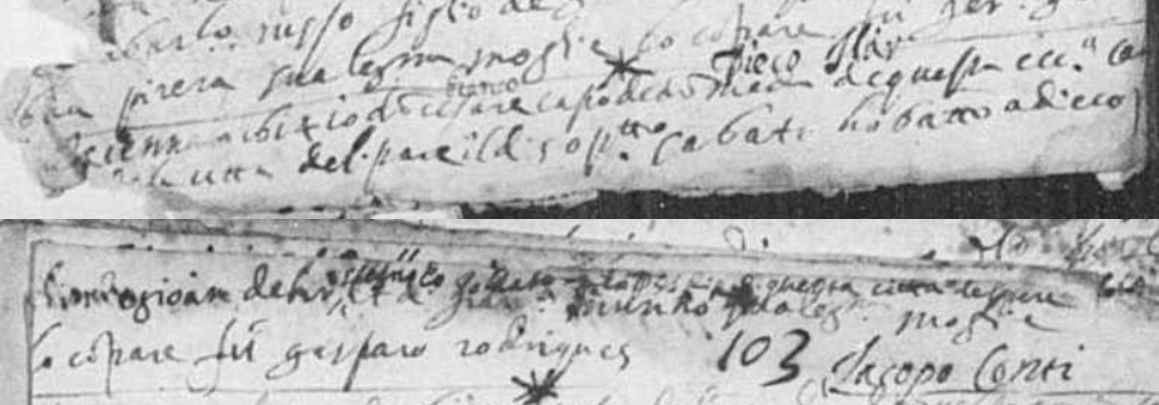The Ustica Connection
Newsletter of the Congregazione di San Bartolomeo Apostolo
Issue 18 - 7 June 2020
Ancient origins of the Ailara family of Ustica
By Chris Caravella
The Ailara family of Ustica rank 49th in size making them one of the smaller families from Ustica, yet their impact on the Usticesi community has been massive. We owe so much to Vito Ailara, who has been a community leader his whole life and has been instrumental in fostering ties between the San Bartolomeo Society and the Ustica Study Center, of which he was president for many years. Our ability to trace our families back to very earliest years of the last, permanent colonization of Ustica in the 1760s is largely due to his herculean effort. The Ailara family of Ustica also has a fascinating story on Lipari and provide an example of how the "history" in family history goes way beyond lists of the deceased, and provides context to the greater history of the region.
The Ailara family are a first family of Ustica first appearing the Ustica church registers in 1764 with the birth of a child to Antonino Ailara and Felicia LoIacono. They were married in Lipari in 1743 and migrated to Ustica with seven children. They are the progenitors of all of the Ailara family of Ustica. Though there are records of some individuals in the US, they never established a lasting presence in America.
In Lipari, the Ailara family can be traced back three more generations to the birth of a child to Diego Ailara and Margherita Vasquez in 1634. If you're thinking that sounds mighty Spanish, then you are correct. And, here is where the history of Lipari ties in. Way back in 1544 Lipari was burnt to the ground by the Ottoman Turks. Many Lipari families were enslaved never to return to the island. Lipari at the time fell under the dominion of King Charles V of Spain and, determined not to be undermined by the attack, he sent Spanish crews and soldiers to rebuild and fortify the city. There are many Lipari families that have traditionally Spanish surnames. Most notable on Ustica is Lopez, and on Lipari we also find other surnames like Rodrigues, Hurtado, Perez, Vasquez, Dies (Diaz) and Hernandes - obvious also because they lack the ubiquitous vowel at the end of Italian surnames. Surnames like Ailara are less apparent so it is significant when the church records identify them as Spanish. Unfortunately, the Ailara family hits a road block prior to 1634. Diego Ailara could be the son of either of two Ailara families that both have a son named Diego in 1614. The fathers of both of these families are identified as Spanish in some baptism records for their children.

Francisco Aialar and Catherinella Sprizzi (Francesco Ailara and Caterina Sbrizzi) were married on Lipari in 1610. Here, he is clearly identified as "Spagnolo". This 1622 record is for a child named Gioanne (Giovanni). Their son Diego was born 11-Dec-1614.
|

Gioan Delar and Franca Murino (Giovanni Ailara and Francesca Murino) were married on Lipari in 1611. This mess of a record spans pages. At the top of the bottom portion, after the fathers name, is written "Spagnolo soldato", meaning Spanish soldier. This is the baptism record for their son, Diego, born in January 1614. Note that the heading (probably added much later) depicts the child's name as Dieco Ilar.
|
If you are getting the feeling that a lot of this seems circumstantial, then you are correct again. There is no clear evidence of the family relationships beyond Diego Ailara and Margherita Vasques, and the surname varies tremendously between records. That's why it becomes so important to comprehensively analyze as many of the records as possible. In records for Diego Ailara and Margherita Vasquez, the surname ranges from Aghilar to Hilara to Ilara. Aghilar and its variations suggest that the name could have been some form of the Spanish word for eagle, Aguila. The modern form, Ailara, does not appear until the 1780's in the Ustica church records.
The Ailara family does not appear in Lipari records prior to 1610, so it seems they may have been part of a later wave of Spanish resulting from the events of 1544. There is also another early Ailara family on Lipari of which the father is identified as a Spanish soldier from Messina. This suggests that their deployment from Spain may have been more regional. Unfortunately there is not enough evidence to tie the three Ailara families together.
Use the family charts at the Ustica Genealogy Homepage to discover your path back to the ancient origins of the Ailara family of Ustica.

